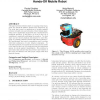Free Online Productivity Tools
i2Speak
i2Symbol
i2OCR
iTex2Img
iWeb2Print
iWeb2Shot
i2Type
iPdf2Split
iPdf2Merge
i2Bopomofo
i2Arabic
i2Style
i2Image
i2PDF
iLatex2Rtf
Sci2ools
HRI
2006
ACM
2006
ACM
Encouraging physical therapy compliance with a hands-Off mobile robot
This paper presents results toward our ongoing research program into hands-off assistive human-robot interaction [6]. Our work has focused on applications of socially assistive robotics in health care and education, where human supervision can be significantly augmented and complemented by intelligent machines. In this paper, we focus on the role of embodiment, empirically addressing the question: “In what ways can the robot’s physical embodiment be used effectively to positively influence human task-related behavior?” We hypothesized that users’ personalities would correlate with their preferences of robot behavior expression. To test this hypothesis, we implemented an autonomous mobile robot aimed at the role of a monitoring and encouragement system for stroke patient rehabilitation. We performed a pilot study that indicates that the presence and behavior of the robot can influence how well people comply with their physical therapy. Categories and Subject Descriptors K....
Assistive Human-robot Interaction | HRI 2006 | Human Robot Interaction | Human-robot Interaction | Robot’s Physical Embodiment |
| Added | 13 Jun 2010 |
| Updated | 13 Jun 2010 |
| Type | Conference |
| Year | 2006 |
| Where | HRI |
| Authors | Rachel Gockley, Maja J. Mataric |
Comments (0)

